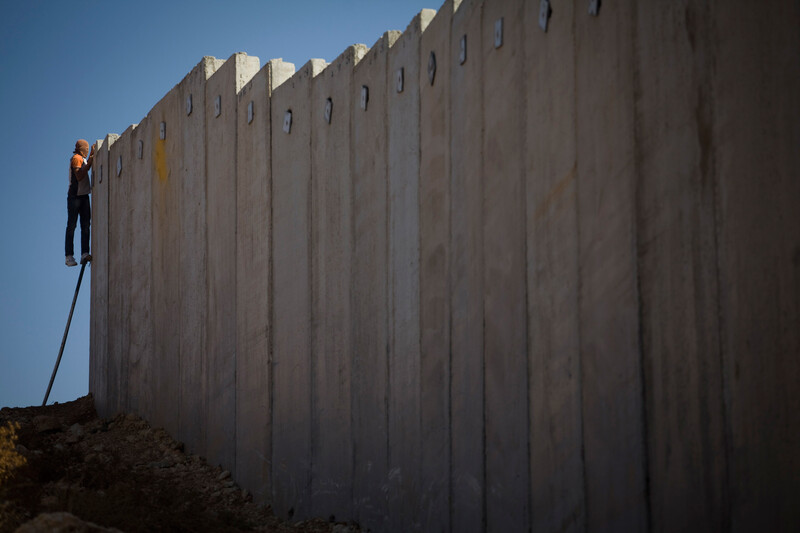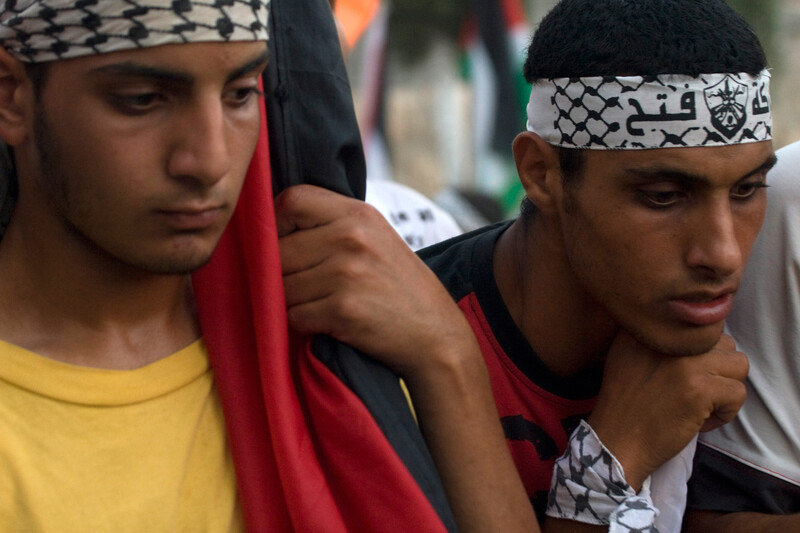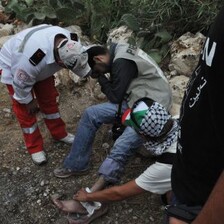The Electronic Intifada Chicago 23 August 2012

Nilin village has been resisting Israel’s wall for nearly a decade.
ActiveStillsSaeed Amireh, an activist who has helped put his occupied West Bank village of Nilin on the solidarity radar, turned 20 last September on a plane taking him to Sweden for a European speaking tour. It was Amireh’s first trip outside of Palestine.
“I’ve never been to Hebron, Bethlehem, Qalqiliya or any other city in Palestine besides Ramallah and Nilin,” Amireh recounted. “Once I got to Sweden, I was completely shocked. I could not say a single word for the first two weeks; I spent the first two weeks crying because you could feel how there is a huge difference” between life in Europe and life under Israeli military occupation in the West Bank.
“I got the taste of sleeping without [fear], walking the street without checkpoints and being stopped by anyone,” Amireh said. “Here you always have to have your ID with you in case of any checkpoint or if anyone stops you and arrests you. … I could taste temporary freedom for three months.”
Though Amireh says he received a tempting offer to stay in Europe, which he acknowledges is no utopia, it was this taste of freedom that motivated him to return to Nilin and “tell my people, my village and all of my friends about [the freedom] we are fighting for. All our generations were born under occupation. We are fighting for freedom and liberation, but we don’t know how it tastes on the ground.”
For Amireh, the struggle for Palestine means building the grassroots movement in Nilin, spreading it to other villages, and “building a strong [social] system that includes even the cultural life in the village” to combat Israel’s thorough assault on all aspects of Palestinian life.
Nearly a decade of struggle against the wall
The popular resistance against the wall and settlements in Nilin started spontaneously in 2003 when villagers joined confrontations in the nearby village of Budrus to prevent Israeli bulldozers from digging in the land to build the wall. This was before popular committees began to be formed throughout the West Bank, before Israeli and international activists joined protests, and before any attention was paid by the media.
“We gathered people from all the villages and we went to protest the building of the apartheid wall [in Budrus],” Amireh recounted.
“The soldiers put a line in front of us, and they told us, if you cross this line, consider yourself dead. We held each other’s hands — men and women, there were dozens of women at that time — and we counted one, two, three and we jumped on the line together, all of us. And the soldiers could not kill all of us, and they became afraid because they knew that if we could break all the fears again, and do this, this struggle will be stronger,” he said.
A year later, the bulldozers came to Nilin, and villagers protested daily, camping out for more than a month to prevent Israeli forces from digging on the land. This prevented the army from building the wall for four years, according to Amireh, and helped the village “save more than 3,000 dunums [a dunum is the equivalent of 1,000 square meters] of our land which was supposed to be confiscated by the wall.”
But the army came back in July of 2008 “with so much anger and so much preparation for collective suppression,” Amireh recalled. The military imposed four consecutive days of curfew on the village, began conducting regular night raids and arrest campaigns and used brutal force against the village’s now weekly protests, led by a popular committee whose leaders were targeted for arrest.
Five villagers killed in one year
Several residents of this small village have been killed by the army during the ongoing weekly protests. Amireh spoke with The Electronic Intifada in late June, shortly after the village marked the anniversary of the killing of 36-year-old Aqil Srour, who was shot in the heart by Israeli forces on 9 June 2009 during the weekly demonstration. A .22 bullet pierced Srour’s chest as he attempted to retrieve a 16-year-old boy who had been shot in the stomach. Srour died on the way to the hospital. The youngest of his four children, Ramees, had yet to be born.
Saeed Amireh and others have carefully documented the struggle in their village. A video uploaded to YouTube shows Srour wounded in the chest and a resident of the village — with remarkable calm — asking an Israeli soldier why the army is present in the village, and why they shot Aqil Srour after they had shot a boy in the stomach.
The Israeli soldier dispassionately replies, with an M16 rifle draped across his chest, “after the injury of the first one, you started throwing stones and the soldier felt threatened.”
Four other residents of Nilin were killed during the weekly protests in the space of one year — 9-year-old Ahmed Moussa, 17-year-old Youssef Amireh, 23-year-old Arafat Khawaje and 18-year-old Muhammad Khawaje. There have been hundreds more injuries, some of them resulting in permanent disability.

Saeed Amireh (left) at the funeral of Youssef Amireh, July 2008.
ActiveStills“Whenever they [the Israeli army] leave, and they leave the empty bullets, it’s written on the cartons, ‘Made in USA,’” Saeed Amireh pointed out.
Amireh described the killing of Ahmed Moussa: “I was close to him at the time [the army shot him]; I was 16 and a half years old. When I carried Ahmad to the ambulance, his brain fell out of his head onto my hands, and then I fell down [out of shock].”
He added, “Despite the killing, the next day we made a demonstration and condemned [the army’s brutality] at Ahmad’s funeral. And on the same day, they killed another guy, he’s from my family, one of my best friends, his name is Yousef Amireh. [They shot him] in his head with two rubber-coated steel bullets, and he died in a hospital bed four days later.”
Arafat and Mohammed Khawaje were both shot in the head with live ammunition in December 2008, during a protest against Israel’s slaughter in Gaza. A US activist, Tristan Anderson, was critically wounded by Israeli forces during a 2009 protest and is permanently disabled from injury to his brain.
Children targeted for arrest
Saeed Amireh has been shot at several times himself, and was arrested in December 2008 when he was 17 years old and in his last year of secondary school.
“In terms of our study, your future depends on this year,” Amireh said. “I was on a scientific [track] and my average was more than 95 percent; by arresting me they were targeting my future as well as punishing my father, who is one of the organizers of this struggle of unarmed protest against the wall” (Amireh recounted his father’s arrest for The Electronic Intifada two years ago).
Children are targeted for arrest, Amireh said, because Israeli forces have greater success in coercing them to sign false statements used to incriminate and arrest the popular committee leadership for “illegal protest” or being in a closed military area.
“[The army] makes a very huge campaign of late night raids with [mass] arrests, like they did in 2008 and 2009 and 2010. In the last four years they have been doing the same system of arresting between 40 to 50, sometimes 60 persons from the village,” Amireh explained.
According to Amireh, many of those who have been recently arrested in the village were detained during the last wave of arrests, which upon their release the Israeli court forbade them from joining the protests for the next two or three years. By criminalizing protest, Israel creates a revolving-door prison system to repress the grassroots movement.
“We join the demonstrations [anyways] because we don’t obey Israeli law, because this is the occupation and the judge is a settler and the lawyer is an Israeli. From where do you get justice? We will never give up despite all these arrests; after they are arrested, the people join the demonstrations again,” Amireh said.
Ethnic cleansing under the radar
Despite the killings, and despite the repression, Amireh maintains that he and others in the village will continue to struggle for Nilin’s very existence.
“They don’t want to kill and massacre us as they did in 1948, the Nakba, and the Naksa,” Amireh said, referring to the dispossession of historic Palestine with the establishment of the state of Israel, and the military occupation of the West Bank and Gaza following the 1967 war. “They just want to kill the source of existence for the people, so that the people leave on their own.” In Palestine, where agriculture is the main industry, that means preventing people from working their lands.
Amireh added that the population of Nilin — located in Area C of the West Bank, meaning that it is under full Israeli military control — has greatly diminished as a result of Israeli colonization and oppression. The current “total inhabitants is about 5,000 of a total of 12,000 because there are 7,000 who have left the village since 1967,” emigrating to nearby towns or further afield in Germany, where the Palestinian diplomatic representative is from Nilin and a relative of Amireh.
“Our village land was more than 58,000 dunums and now we have just 8,000 dunums” as a result of the five settlement colonies surrounding the village and Israel’s wall and roads for settlement use only.
Village tears down wall
“Nothing is going to stop our quest for freedom,” Amireh said. “Even the Berlin wall fell, and this wall will fall. And we succeeded to do it several times [destroy parts of Israel’s wall].”
On the same day that villagers tore down part of the wall in Bilin village in October 2009, residents in Nilin managed to dismantle part of the wall built on their land. Israel has since fortified the wall so now there is an electronic fence, a concrete wall and a wall of barbed wire cutting the village off from their agricultural land.
“Despite this, we start to burn tires, wheels, at the concrete wall … and we start to throw water at the concrete after it becomes hot, and start to make holes. So there are several holes now in the concrete wall,” Amireh explained.
Direct confrontation with the wall and army is just one of many means of struggle that the village must draw upon, according to Amireh.
“We are living under occupation; we have the right to resist by all means,” he said. “But we see [grassroots struggle] as the most effective strategy the Palestinians have ever used … We want to expand this strategy of struggle all over the West Bank so that there can be real pressure from inside the Palestinian land against the occupation, like how it was during the first intifada” in the late 1980s.
Pressure from outside
There is a need for pressure from the outside, too, Amireh explained, adding that people around the world need to “wake up and be aware of what is going on … it’s everybody’s duty to help us end this occupation, because part of your taxes in America, in Europe goes to support this occupation, and as long as this occupation is getting funded, it will never end.”
Towards this end, Amireh spoke in Australia earlier this year (his second trip outside Palestine) and is about to embark on a several-month speaking tour of Europe this fall. He hopes to travel to the US next year to raise awareness about what happens on the ground in Palestine and doesn’t get covered in the international media.
But awareness needs to be translated into action. Boycott is a key means of putting pressure on Israel from outside, and Amireh has been involved in cultural boycott campaigns urging international stars to cancel their Tel Aviv concerts. Amireh and a relative appear in a video which shows their attempt to travel to Madonna’s concert earlier this year only to be prevented by Israel’s infrastructure of occupation.
“Israel is aware of this pressure that comes from outside and from inside, and they try to suppress this struggle by all means,” Amireh said. “There are future challenges for our struggle to make it strong.”
These include breaking “fears and silence” in the international arena and, in Palestine, overcoming political division and building strong social networks at the grassroots level.
“We are fought from our culture, we are fought from our education; Israel is controlling everything and they’re changing everything for [their benefit],” Amireh said.
Young Palestinians like Saeed Amireh are dedicating their lives to finding innovative ways to challenge this system of control so one day it will be a thing of the past.
Maureen Clare Murphy is managing editor of The Electronic Intifada.




